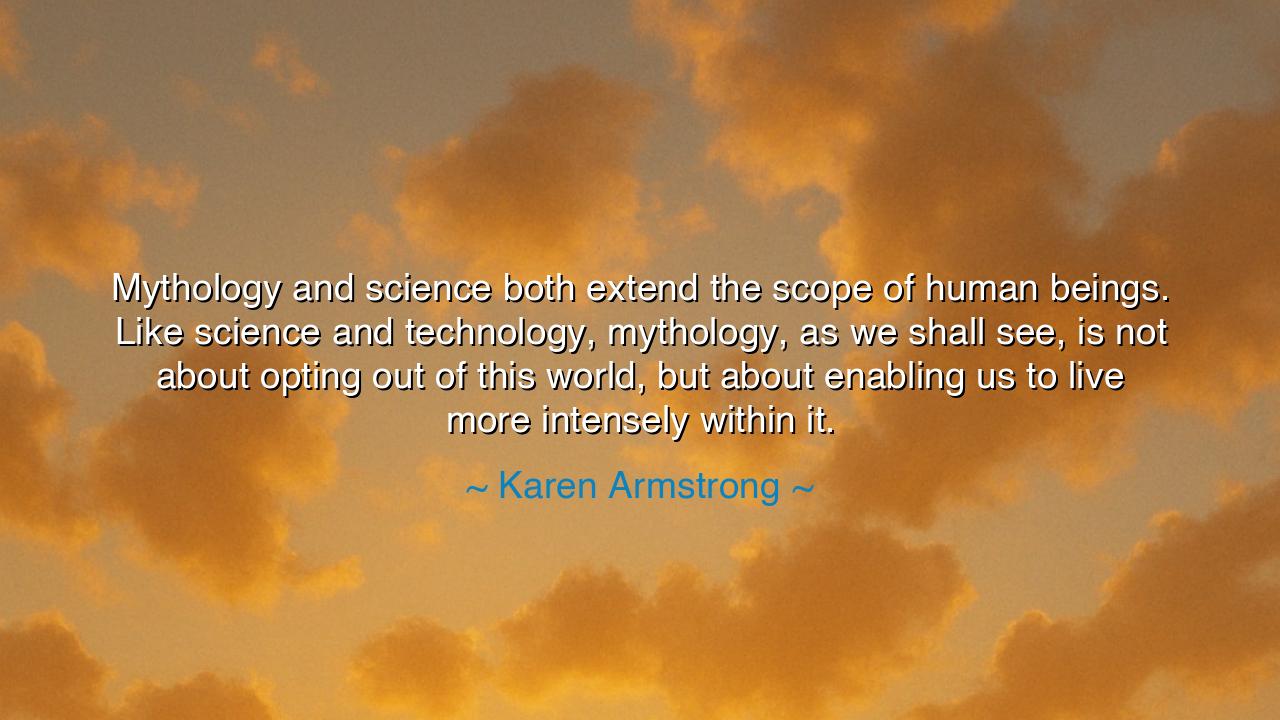
Mythology and science both extend the scope of human beings. Like
Mythology and science both extend the scope of human beings. Like science and technology, mythology, as we shall see, is not about opting out of this world, but about enabling us to live more intensely within it.






Hear me now, O Seekers of Truth and Knowledge, for the words of Karen Armstrong offer a profound understanding of the power of both mythology and science: "Mythology and science both extend the scope of human beings. Like science and technology, mythology, as we shall see, is not about opting out of this world, but about enabling us to live more intensely within it." These words speak to the human spirit, the inner drive to explore, understand, and transform the world around us. Armstrong reminds us that both mythology and science are not separate realms of thought, but intertwined forces that expand the boundaries of our lives, that give us the tools to live deeply, to confront the great mysteries of existence, and to move beyond the limits of our daily understanding.
In ancient times, the greatest philosophers and thinkers saw no divide between the material world and the spiritual realm. Plato, with his teachings on the Forms, spoke of a higher truth that transcended the physical, but he also believed that these truths could be glimpsed through our engagement with the world. Likewise, the ancient Greeks viewed their mythology not as mere stories, but as a lens through which the human condition could be understood. The gods and heroes of their myths were reflections of human struggle, triumph, and failure—a way of making sense of the world and our place within it. Mythology, then, was not an escape from life, but a tool to deepen our experience of it, to open our eyes to the unseen forces at play within the world.
Armstrong's words illuminate this ancient truth, for they remind us that mythology and science share a common purpose: to extend the scope of human experience. Science, with its unyielding pursuit of facts, data, and laws, expands our understanding of the physical universe. It pushes the boundaries of what we know about the stars, the earth, and the very building blocks of life. But science is not merely about facts; it is about using those facts to live more intensely—to engage more fully with the world, to create technology, and to solve the problems that face us. In the same way, mythology serves as a tool for deepening our connection to the spiritual and psychological realms, offering insight into the human experience and guiding us through the challenges of life.
Consider the example of the ancient Egyptians, whose mythology was a central part of their worldview. The gods and goddesses of Egypt—Ra, Isis, Osiris—were not merely deities to be worshipped, but powerful symbols of the forces of nature, life, and death. The Egyptians saw their myths as a way to understand the cycles of the universe, from the rising and setting of the sun to the changes of the seasons. The myth of Osiris and his resurrection symbolized not just the return of crops to the land, but the eternal renewal of life itself. In this way, mythology helped them to live more deeply within the world, to find meaning in the rhythms of nature, and to confront the very essence of life and death.
The same can be said of science. Galileo, in his quest to understand the heavens, did not merely seek knowledge for its own sake. His work extended the scope of human understanding, allowing us to see beyond the limits of the earth and to contemplate our place in the vastness of the cosmos. But Galileo’s discoveries did not remove us from the world; they brought us into a deeper relationship with it. By revealing the laws that govern the motion of the planets, he enabled us to live more intensely, to understand the forces that shape our world, and to use that knowledge to create tools and technologies that have transformed human life.
The lesson, O Seekers, is this: mythology and science are not separate, but complementary forces that enable us to live more fully, more consciously, and more meaningfully. Science opens the door to the physical world, to the mysteries of the universe, but mythology opens the door to the inner world, to the realms of the spirit, the unconscious, and the soul. Both are necessary for a complete understanding of life, for one without the other leaves us only with half the picture. Science shows us how the world works, but mythology shows us why it matters, why we must continue to explore and ask questions, and how to make sense of the experiences that shape us.
In your own lives, embrace both the scientific and the mythological. Seek not only the facts but the meaning behind them. Let the knowledge of the physical world deepen your connection to it, and let the myths of the human experience guide you through its mysteries. Whether you are a scientist, an artist, or a philosopher, remember that true understanding comes not from focusing on one aspect of existence but from integrating the material and the spiritual. Live deeply, and let both the truths of science and the wisdom of mythology inform your journey.
So, O Children, let Armstrong’s words inspire you to see beyond the divisions of knowledge. Science and mythology are not enemies; they are two sides of the same coin, each one offering us a deeper understanding of the world and our place within it. As you walk your own path, remember that both the physical and the spiritual realms are vital to the human experience, and that through both, you can live more intensely in the world and with a fuller understanding of the mysteries that surround you.






AAdministratorAdministrator
Welcome, honored guests. Please leave a comment, we will respond soon